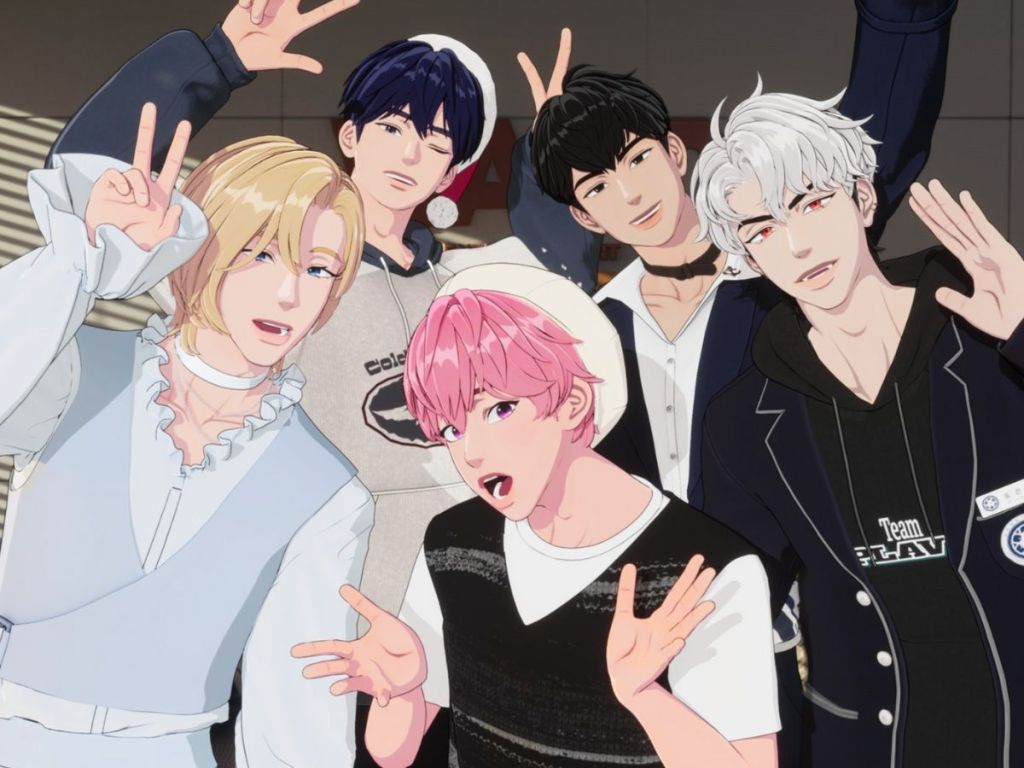I’ve always been a k-pop fan. I’ve started following k-pop since the dawn of the ‘hallyu’ wave, and it’s extremely impressive how far k-pop has come to become a global subculture with an undying fanbase.
So, it didn’t come as a surprise to me when virtual idols started emerging in the k-pop industry. But what’s fascinating is how quickly they’re racking up views on TikTok and Instagram, and how seriously record labels are pushing them. Now, they’re even afforded legal protections that some k-pop idols don’t have.
PLAVE, a five-person virtual k-pop group conjured from 2D animation, is making headlines once again in k-pop. Real human artists hide behind PLAVE, but nobody knows who they are. They lend their vocals for PLAVE’s music, and motion capture technology is used for dance choreography. They just dropped a new single that’s had nearly 8 million views. They recently also won first place at a fan-voted music show in South Korea.
Now, PLAVE has reached that level of fame where punters are spreading rumours about them—because their agency is threatening legal action against up to 20,000 malicious and defamatory comments. Congratulations, I guess?!
In other words, yes, people are directing hate speech towards 2D cartoons. This sentence is so 2024!
Does ‘virtual idol’ = AI?
Not always. But first, some context for those who are unfamiliar. A k-pop ‘virtual idol’, as the name suggests, is a celebrity who is presented as an animation at public appearances. Live performances, interviews, social media content—you name it.
In k-pop, there are two types of virtual idols. There are those whose image and vocals are purely conjured up with AI technology, and those with real humans behind the scenes but whose identities are deliberately concealed. PLAVE falls into the latter.
The real identities of the men behind PLAVE are unknown. All members use a stage name. Songwriting, vocal, and composer credits for the group also go under PLAVE instead of real names.
Last week, PLAVE’s agency, VLAST, revealed that it is working with South Korean police to track down the IP addresses of users who left defamatory comments towards PLAVE online. VLAST shared that 30 hate cases have been identified as “prosecutable” in court per South Korean media.
VLAST’s full statement reads:
Our company, VLAST, continually monitors malicious comments aimed at PLAVE members, including slander, defamation, and unauthorised disclosure of artists’ personal information, as well as those spreading baseless rumours about the company. We’d like to inform you that we are carefully reviewing the matters reported by fans and taking strict legal action against them.
… Legal actions have also been initiated against individuals spreading unfounded rumours about PLAVE and our company on Twitter [X]…
… We have demanded strict punishment under a zero-tolerance policy against the suspects, and following criminal prosecution, we will firmly pursue all legal proceedings, including civil damages claims. Our company will also consistently apply this policy to all future incidents.
Hello????! Who’s spreading hate against cartoons?!?!? They’re not even controversial in the slightest!?!!!
For context, real life k-pop idols are subject to extreme levels of online harassment and trolling. Internet abuse and harassment were thought to contribute to the tragic suicide of Korean female starlets Goo Hara and Sulli in 2019.
Shortly after Sulli’s passing, South Korean lawmakers proposed ‘Sulli’s law’, a bill named after the starlet that aimed to target cyberbullying and harassment. However, the bill reportedly fell through in 2020.
Last year, SM Entertainment, one of the ‘Big Three’ k-pop labels in South Korea, launched a dedicated portal for fans to report harassment towards the company’s artists. However, SM Entertainment’s perceived inaction after the portal’s launch have made the company a meme in the k-pop community. The Chainsaw has reached out to SM Entertainment for comment.
Protect whomst?
It’s also here that further questions about copyright and defamation arise. If nobody knows the real humans behind PLAVE and are thus not directing hate comments towards those individuals, who is VLAST actually protecting?
In South Korea, there has yet to be laws on the regulation of virtual idols. However, “a virtual celebrity is still an agency’s intellectual property”, explains Dr. Sarah Keith, Senior Lecturer in Media and Music at Macquarie University who specialises in South Korean popular media.
Thus, “an agency could certainly pursue legal proceedings against individuals if their online activities were shown to be malicious, groundless, and defamatory, with the intent of harming the property of the agency, and the agency’s business activities,” Dr. Keith adds.
That some pixels are so aggressively protected also speaks to the legitimacy and acceptance of virtual idols in the k-pop fanosphere.
“Netizens might feel that the group is attracting too much attention and diverting attention from other, more deserving groups. This criticism might be focused on the group’s production, the quality of their songs, or the virtual ‘personalities’ that the idols have been given,” Dr. Keith notes.
Image: @plave_official via Instagram



